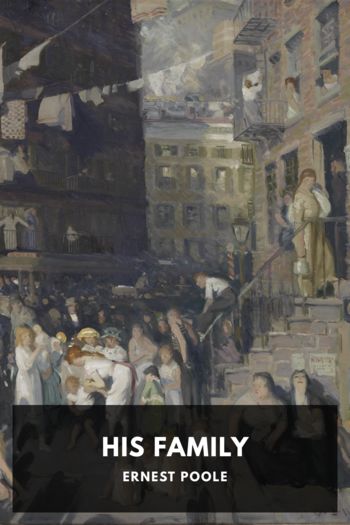His Family - Ernest Poole (ereader for comics .txt) 📗

- Author: Ernest Poole
Book online «His Family - Ernest Poole (ereader for comics .txt) 📗». Author Ernest Poole
“In their lives, too, we shall be there—the dim strong figures of the past.”
From his desk he gathered a few belongings. Then he looked into John’s small room, with the big gold motto over the desk: “This is no place for your troubles or mine.” On the desk lay that small album, John’s parting gift to Deborah’s boy. Roger picked it up and walked out of the office. He had never liked goodbyes.
In the elevator he noticed that his shoes needed shining, and when he reached the street below he stopped at the stand on the corner. The stocky Greek with bushy black hair, who had run the stand for many years, gave him a cheery greeting; for Roger had stopped there frequently—not that he cared about his shoes, but he had always liked to watch the crowds of people passing.
“No hurry, boss?”
“None,” said Roger.
“Then I give a fine shine! Polish, too?”
“Yes, polish, too.” And Roger settled back to watch.
“And put in new shoe strings,” he added, with a whimsical smile.
Men and women, girls and boys by thousands passed him, pushing, hurrying, shuffling by. Girls tittering and nudging and darting quick side glances. Bobbing heads and figures, vigorous steps and dancing eyes. Life bubbling over everywhere, in laughter, in sharp angry tones, in glad expectant chatter. Deborah’s big family. Across the street was a movie between two lurid posters, and there was a dance hall overhead. The windows were all open, and faintly above the roar of the street he could hear the piano, drum, fiddle and horn. The thoroughfare each moment grew more tumultuous to his ears, with trolley cars and taxis, motor busses, trucks and drays. A small red motor dashed uptown with piles of evening papers; a great black motor hearse rushed by. In a taxi which had stopped in a jam, a man was kissing a girl in his arms, and both of them were laughing. The smart little toque of blue satin she wore was crushed to one side. How red were her lips as she threw back her head. …
“Silk or cotton, boss? Which you like?” Roger glanced at the shoe strings and pondered.
“Silk,” he grunted in reply. Idly for a moment he watched this busy little man. From whence had he come in far away Greece? What existence had he here, and what kind of life would he still have through those many years to come? A feeling half of sadness crept into Roger’s heavy eyes as he looked at the man, at his smiling face and then at other faces in the multitudes sweeping past. The moment he tried to single them out, how doubly chaotic it became. What an ocean of warm desires, passions, vivid hopes and worries. Vaguely he could feel them pass. Often in the midst of his life, his active and self-centered life, Roger had looked at these crowds on the street and had thought these faces commonplace. But now at the end it was not so.
A woman with a baby carriage stopped directly in front of him and stood there anxiously watching for a chance to cross the street. And Roger thought of Deborah. Heavily he climbed down from his seat, paid the man and bade him good night, and went home to see Deborah’s baby.
For a long time he sat by the cradle. Presently Deborah joined him, and soon they were laughing heartily at the astonishing jerks and kicks and grimaces of the tiny boy. He was having his bath and he hated it. But safe at last on his mother’s lap, wrapped to his ears in a big soft towel, he grew very gay and contented and looked waggishly about.
There followed long lazy days of spring, as April drifted into May. Early in the morning Roger could hear through his window the cries of the vendors of flowers and fruits. And he listened drowsily. He rose late and spent most of the day in the house; but occasionally he went out for a stroll. And one balmy evening when groups of youths came trooping by, singing in close harmony, Roger called a taxi and went far down through the tenement streets to a favorite haunt of his, a little Syrian pawnshop, where after long delving he purchased a ring to put in the new collection that he had been making lately. He had nearly a dozen now.
Days passed. The house was still so quiet, Deborah was still upstairs. At last, one night upon leaving his study, he stopped uncertainly in the hall. He took more time than was his wont in closing up the house for the night, in trying all the windows, in turning out the various lights. Room after room he left in the dark. Then he went slowly up the stairs, his hand gratefully feeling those guiding points grown so familiar to his touch through many thousand evenings. His hand lingered on the banister and he stopped again to listen there.
He did not come downstairs again.
He was able to sleep but little at night. Turning restlessly on his bed, he would glance out of the window up at the beetling wall close by, tier on tier of apartments from which faint voices dropped out of the dark. Gradually as the night wore on, these voices would all





Comments (0)